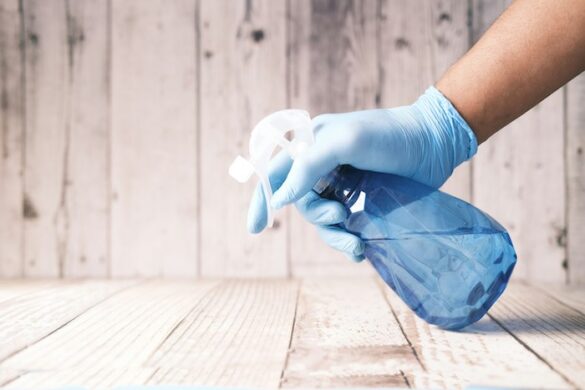Mold Removal DIY Steps
What do you do when you’ve spotted mold in your home? You’ve heard of all the negative effects mold can have on your health and it can really ruin the appearance of a room, so of course you want to get it cleaned up quickly. For larger mold infestations, you’ll have to call in the professionals, but if you’re looking to clean up surface mold you can handle it up yourself with just a few steps.
Find the Source
Mold can only grow in moist conditions, so you need to find the source of mold before attempting to remove it. If you clean up mold without addressing the moisture source, it will continue to grow back. Unaddressed leaks, damp areas in the basement or attic, and appliance malfunctions like dishwashers and washing machines are all common causes of mold growth. Signs like warped walls or rust can help you to determine where your moisture is coming from.
Take Safety Measures
Direct contact with mold can cause negative health effects, so it’s important to protect yourself before you start cleaning. Wear an air mask to avoid breathing any mold spores in and wear gloves and long sleeves to protect your skin from contact. It’s advised to wear a Tyvek suite.
Apply Cleaning Product (With Caution)
Most of the cleaning products you’ll use to clean up mold infestations have bleach in them. This works well for surface mold, but if your infestation is deeper in the walls it will end up making the infestation worse. It will only add moisture to the roots of the mold, which will help it grow. If you’re sure your problem is only surface mold, apply your cleaning product with a damp rag or sponge. Let it soak on the area for a few minutes and then lightly scrub in a circular motion.
Clean Your Work Area
After you’ve scrubbed away all visible mold, make sure you wipe off any excess cleaning product and dry the area. Throw away any towels, rags, or sponges you used to clean the mold. Mold spores can continue to live on these products and if you use them to clean another area of the house, mold is likely to spread there too.
Keep Checking the Area
It’s important to keep an eye out on the spot you cleaned for the weeks immediately following. If you see the mold start to grow back, then that means it was deeper than surface mold and you likely aggravated the problem. In this case, it’s time to call in the professionals.
CRD Restore has a team of IICRC certified technicians that are trained remove and contain damage, remove contamination, and dry materials to ensure mold will not come back. Using our mold remediation services means a guarantee that your mold is taken care of once and for all.





1 comment